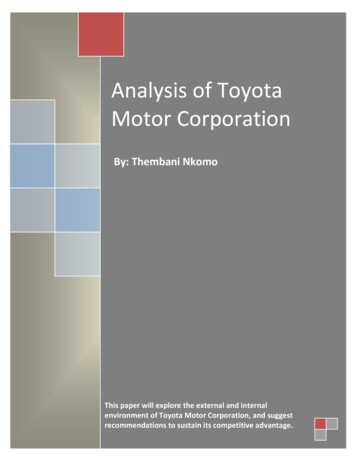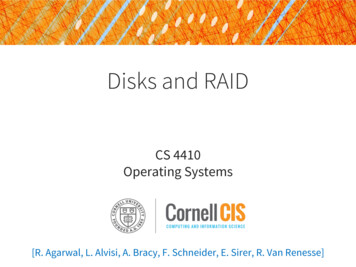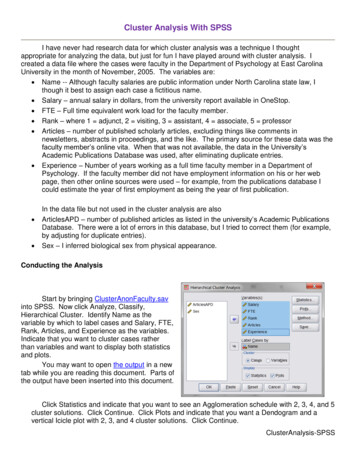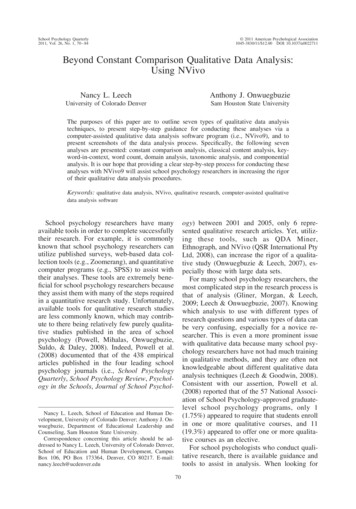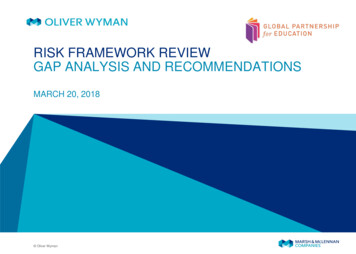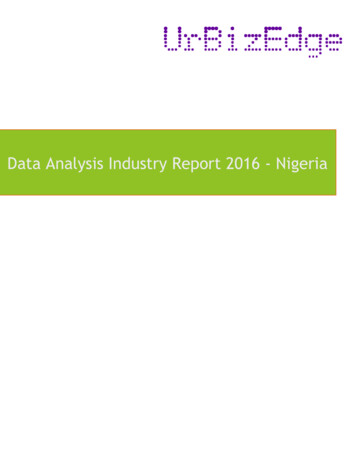
Transcription
Data Analysis Industry Report 2016 - Nigeria
Data Analysis Industry Report 2016 - NigeriaContentsForeword . 2Introduction. 3Nigerian Data Analysis Market. 4Server Based Analytics segment . 4Self-service BI segment. 4Spreadsheet Based Analytics segment . 5Data Analysis Awareness In Nigeria . 5The Future And The Opportunities . 7About Us . 9www.urbizedge.com 17-May-20161
Data Analysis Industry Report 2016 - NigeriaForewordData is the new crude oil. And business success in the 21st century is heavily reliant onthe ability to mine and use relevant data about consumers, internal operations,financial operation and industry trend. This has given rise to a new fast growingindustry: the data analysis industry.Globally, it is a 16 billion industry and growing at a rate of 15% yearly. However, inNigeria it is estimated to be about 150 million market and there are no strong localplayers in the industry. About 90% of the industry is serviced by foreign providers likeOracle, SAP, Microsoft, IBM and Tableau, often via local partners. They often sell massproduced solution offerings that users have to modify their operations or data to fitinto which is creating a huge market opportunity for a more flexible better productlocal provider with deep knowledge of the Nigerian market.From our experience working with companies – from multinationals to small businesses– we have gained a lot of knowledge about the Nigerian market and this report is aclear presentation of that knowledge for the benefits of business leaders, data analysisenthusiasts and every business that is seeking to use data to improve its operations.As the lead consultant for UrBizEdge, I have been fortunate to catch the early wavesof the data analysis ocean, and it has afforded me the rare privilege of seeing anentire industry come to life in an interesting market like Nigeria’s. In interacting withdozens of companies and hundreds of business professionals, I have experienced firsthand the perceptions – both wrong and correct – that business professionals have aboutdata analysis. I have seen business executives struggle with being on top of theirbusiness operations data; I have seen analysts confused by the plethora of toolsavailable; and I have seen almost everyone confused by the different terminologies(business intelligence, data analysis, data analytics, business analysis, datavisualization, etc.). I hope this report will reduce the number of people confused, andhelp business leaders and data enthusiasts make better informed decisions.Michael Olafusi, Excel MVPLead Consultant,mike@urbizedge.com 234-806-312-5227UrBizEdge Limitedwww.urbizedge.com 17-May-20162
Data Analysis Industry Report 2016 - NigeriaIntroductionData analysis is the structured use of data for decision making. It is the umbrella namefor all forms of analysis that the primary input is data. InvestorWords has one of thebest definitions for data analysis: “The process of extracting, compiling and modellingraw data for purposes of obtaining constructive information that can be applied toformulating conclusions, predicting outcomes or supporting decisions in business,scientific and social sciences settings.” 1Data analysis can be descriptive, exploratory, predictive or prescriptive analysis.Descriptive analysis focuses more on using data to explain what has happened in a predefined way. Exploratory analysis is similar to descriptive analysis but focuses more ondiscovering new relationships within the data analysed. So while it also seeks toexplain the past (descriptive analysis), it focuses more on discovering new links withinthe dataset rather than testing pre-defined relationships (metrics and KPIs). Predictiveanalysis goes further than descriptive and exploratory analyses; it focuses more on thefuture, trying to explain what could happen. Prescriptive analysis is a step ahead ofpredictive analysis, using algorithms to automate decision making based on the outputof the predictive analysis.Recently, there has emerged new distinct forms of data analysis. And these are theones that confuse most people. They are business analytics, business intelligence andbig data analysis. I also see people confuse business analysis with business analytics.Business analysis is not a form of data analysis; in fact, it is another field entirely.According to the International Institute of Business Analysis (IIBA) which is regarded asthe global governing body for the business analysis profession, “Business Analysis is thepractice of enabling change in an organizational context, by defining needs andrecommending solutions that deliver value to stakeholders.”2 Business analysts have alot more in common with project managers than with data analysts.Business analytics is the combination of all the four levels of data analysis:descriptive, exploratory, predictive and prescriptive. Oftentimes, people use otherterms like data analytics and advanced analytics for it. Business analytics allowbusinesses to make the most use of their business data to drive value adding change.Business intelligence is mostly descriptive analysis but on an organization wide level.Rather than having different departments in the company generate standalonereports, with business intelligence the reports can be unified with drill downcapabilities from company level to unit level.1InvestorWords (2016). Data Analysis. [Online] Available at:http://www.investorwords.com/19279/data analysis.html [Accessed 17 May 2016]2IIBA (2016). What is Business Analysis? [Online] Available alysis.aspx [Accessed 17 May 2016]www.urbizedge.com 17-May-20163
Data Analysis Industry Report 2016 - NigeriaBusinesses use business intelligence to have a wholesome understanding of what ishappening at all operational levels of the business. It is not primarily to makepredictions or prescriptions, it focuses on showing what has happened till now. And inmost business use, it is connected to real-time data. Increasingly, though, morebusiness intelligence vendors are now incorporating some basic predictive analysis intheir solutions.Big data analysis is any level of data analysis carried out on big data. Big data refers todata that is too large (high volume) for traditional tools, comes in very fast (highvelocity) and is a combination of both structured and unstructured data (variety). Anyform of analysis for big data requires some special tools (new technology) that aredifferent from the traditional tools used for data analysis. That is why it is separatelyclassified as big data analysis. And in reality, the businesses using big data all try touse it at the predictive or prescriptive data analysis level.Nigerian Data Analysis MarketThe Nigerian Data Analysis market can be broken into three main categories:1. Server Based Analytics segment2. Self-service BI segment3. Spreadsheet Based Analytics segmentServer Based Analytics segmentThis is the high-end segment of the market and only affordable to big companies inNigeria. The main players in Nigeria are Oracle, Microsoft and SAP.They require expensive licences sold through select partners and often don’t integratewell with database not from the provider. Oracle’s OBIEE is engineered to work bestwith Oracle databases, same with Microsoft’s SSRS expecting SQL server databases.They are not only costly to buy but also costly to set-up. Usually, companies engagespecialist consultants to set them up and often find themselves re-engineering theirdata warehouse to suit the analytics solution.Self-service BI segmentThis is the newest segment of the market, came into mainstream in Nigeria in 2014.The main players are Tableau, Microsoft and Qlik.They allow business managers get a lot more control and flexibility on the analysis oftheir business operations data. Rather than a build once and deploy report that iscommon with the Server Based Analytics segment, Self-service BI allows the reports’consumers a lot more flexibility and control over the end reports from their operationsdata by enabling them interact more directly with the underlying data and edit thereports to their own satisfaction.www.urbizedge.com 17-May-20164
Data Analysis Industry Report 2016 - NigeriaThey also break away from the vendor locking that is common with the Server-BasedAnalytics solutions. They make it extremely easy to connect with different datasources from the conventional server database ones to flat files and web services.Lastly, they are cheap and can be easily implemented without external specialistconsultants.Spreadsheet Based Analytics segmentThis is the least sophisticated segment of the market. When companies are not awareof the other options or can’t afford them, they use spreadsheets, especially MicrosoftExcel, for all their business analytics. Microsoft Excel is the biggest player in thissegment.The biggest appeal of this segment is the low cost, both in financial and knowledgeterms. Companies usually have skilled spreadsheet users who build analysis templatesfor day-to-day use.The problem is that they end up using spreadsheets for what they were not designednor suited for. The company finds itself paying a lot more in terms of sub-optimaloperational efficiency due to human errors that abound in using spreadsheets and lackof (easy) collaboration.Spreadsheets are good for ad-hoc analysis and non-complex reports. But when makingcompany-wide reports that should integrate operations data across different units inthe company and present them with detailed insights in real-time, Excel can causemore harm than good.Importantly, companies must be careful to use tools for what they are designated for.They must not let the comfort zone of their internal staff or push from a vendor forcethem into picking a tool without ensuring that it is the right tool.Every company has some key internal features which can work in its favour or againstit, and it is proper to carry out an extensive internal analysis which will help shape thestrategy the company will eventually adopt.Data Analysis Awareness In NigeriaThe biggest issue in the Nigerian marketplace is the knowledge gap. And just like inany market, knowledge gaps lead to inefficient decisions and arbitration. An entireindustry has emerged in Nigeria to exploit this knowledge gap. There is a sea ofconsulting firms in Nigeria who are exploiting the knowledge gap to sell to companiessolutions that don’t fit their need and further confuse them about the way to go aboutsolving their data analysis needs.The decision makers in most companies don’t know much about data analysis andoften rely on outside help, consulting firms which claim expertise in this domain, tohelp them understand and harness it for productive use in their organizations. Thewww.urbizedge.com 17-May-20165
Data Analysis Industry Report 2016 - Nigeriatrouble is that there are too many consultants claiming to know data analysis andcrowding out the few who actually do. In the end, a lot of companies follow the wrongadvice of those consulting firms, buy and implement the wrong data analysis solutionsand don’t see the promised benefits. The results has been a mix of some companiesgiving up and believing that the promised benefits of using data analysis is mostlyhype, and the rest forcing the wrong solutions on their teams to achieve the promisedbenefits.We conducted a survey of 84 professionals across 13 industries (Oil and Gas, Bankingand Financial Services, Media, Health, Information Technology, Government, NGO,FMCG, Ecommerce, Management Consulting, Maritime, Hotels and Hospitality,Logistics and Education).Below is a graphic description of the participants.www.urbizedge.com 17-May-20166
Data Analysis Industry Report 2016 - NigeriaWe asked questions about relevance of data analysis in their company, the use ofanalytics in decision making, the value of data analysis skills in the company,engagement of external data analysis consultants, management perception of dataanalysis and their perceived role of data analysis in today’s business world.The following are the insights we got from their combined responses:1. There is an increasing awareness of the value to productivity and profitabilitythat proper use of data analysis can lead to.2. Companies are placing more value on managers who can make data-drivenbusiness cases3. Most companies still don’t have dedicated data analyst roles4. Most companies don’t yet engage external consultants on putting in place adata analysis system to support/enhance their core operations5. The demand for data analysts is concentrated in specific industries6. Most companies still equate data analysis skills to Microsoft Excel skills7. Many companies still don’t have an integrated way of gathering data relating tooperations. They leave the decision of what data to gather and use to eachseparate unit of the company.The Future And The OpportunitiesThe data analysis industry is already growing in Nigeria. This year we have gottenmore data analysis projects request than in both 2014 and 2015 combined. Part of thisgrowth can be attributed to our growth and increased visibility in the industry but themajor contributor is the increased interest in companies for the operational benefitsof proper data analysis to support their core operations.The largest contributor to this increase are foreign owned companies, multinationals,whose headquarters have instituted an integrated data analysis solution and theNigerian subsidiary needs to plug in by doing one locally too. The next category arewww.urbizedge.com 17-May-20167
Data Analysis Industry Report 2016 - Nigeriathe traditionally data heavy companies – banks, insurance companies, FMCG companiesand telecommunications companies. We are also seeing new generation companies,especially those headed by globally aware managers, take interest in data analysis forimproved operations of their business. And we believe that this trend will only grow.There is a big door of opportunity opening to genuinely competent data analysisconsulting companies. Ones that are more technically sound than salesy. Companieswill trust and give repeat businesses to consulting companies that can demonstratedeep knowledge of the data analysis industry and tools, recommend without beingsalesy the appropriate tools and help the company realise the benefits promised.www.urbizedge.com 17-May-20168
Data Analysis Industry Report 2016 - NigeriaAbout UsUrBizEdge Limited is a registered leading businessdata analysis company in Nigeria.We give you that neededbusiness edge!We help companies get the edge they need fromthe data and tools they already have. We have theindustry’s best data analysis professionals and wehave the only Microsoft Excel Most ValuableProfessional in Africa (there are only about 128 in the whole world).Our laser-like focus in the emerging data analysis industry and broad experienceworking with companies within Nigeria makes us a premium partner to our clients.Our Clientele:www.urbizedge.com 17-May-20169
UrBizEdge Limited20 Kofoworola street,Ikeja, LagosNigeria.Phone: 0700ANALYTICS, 0808-938-2423E-mail: info@urbizedge.comwww.urbizedge.com
classified as big data analysis. And in reality, the businesses using big data all try to use it at the predictive or prescriptive data analysis level. Nigerian Data Analysis Market The Nigerian Data Analysis market can be broken into three main categories: 1. Server Based Analytics segment 2. Self-service BI segment 3. Spreadsheet Based .


